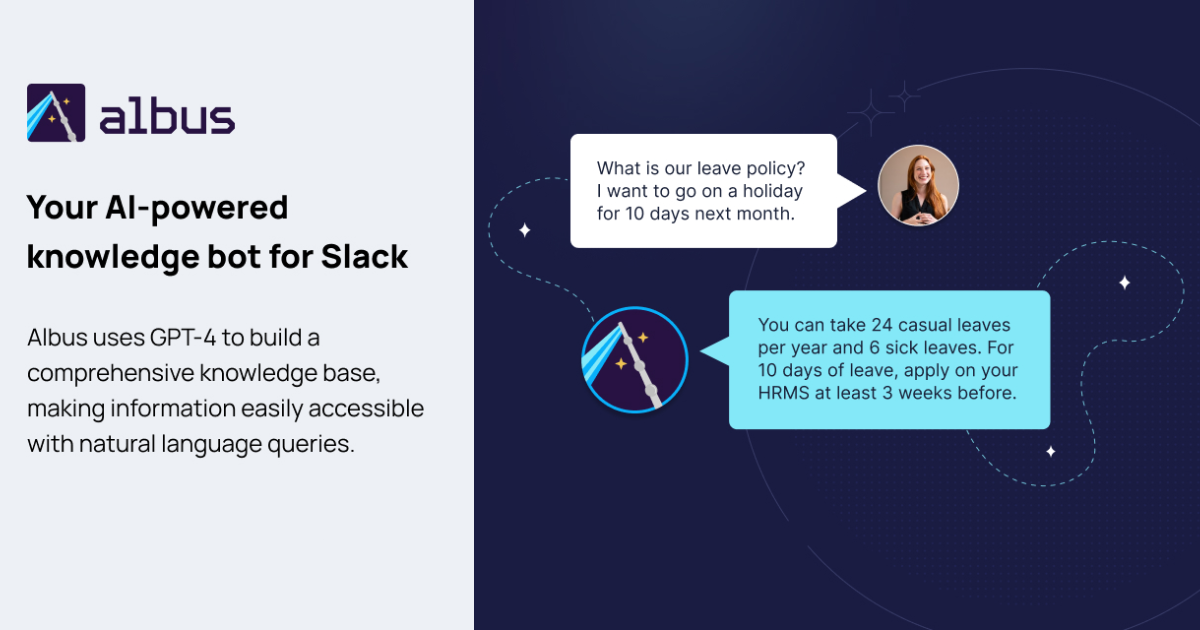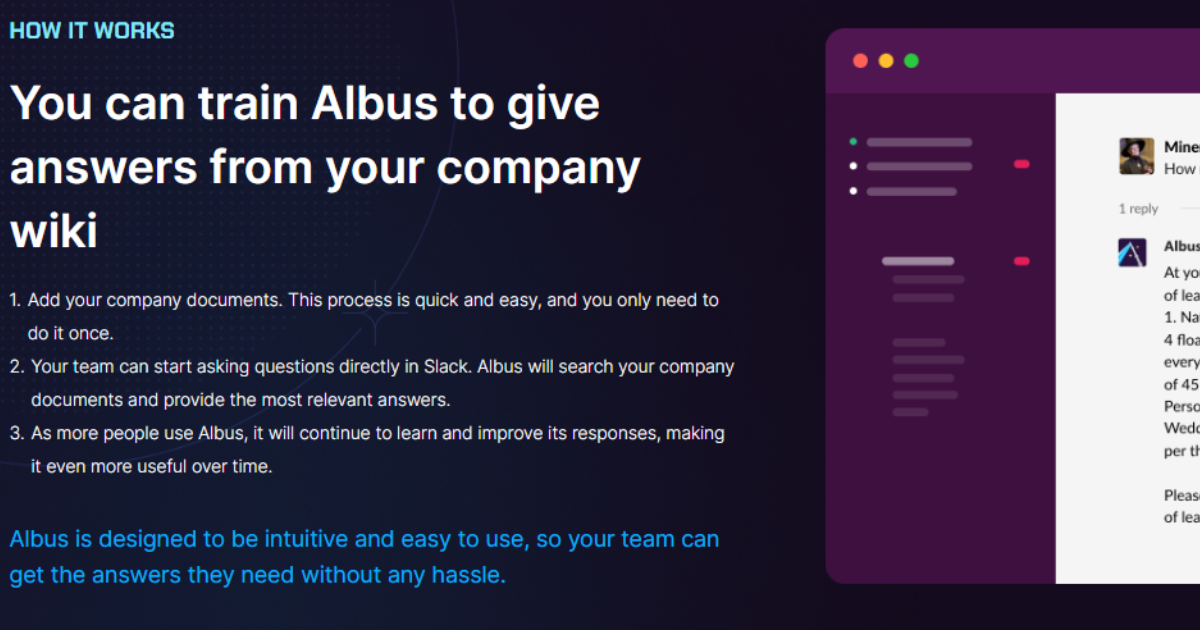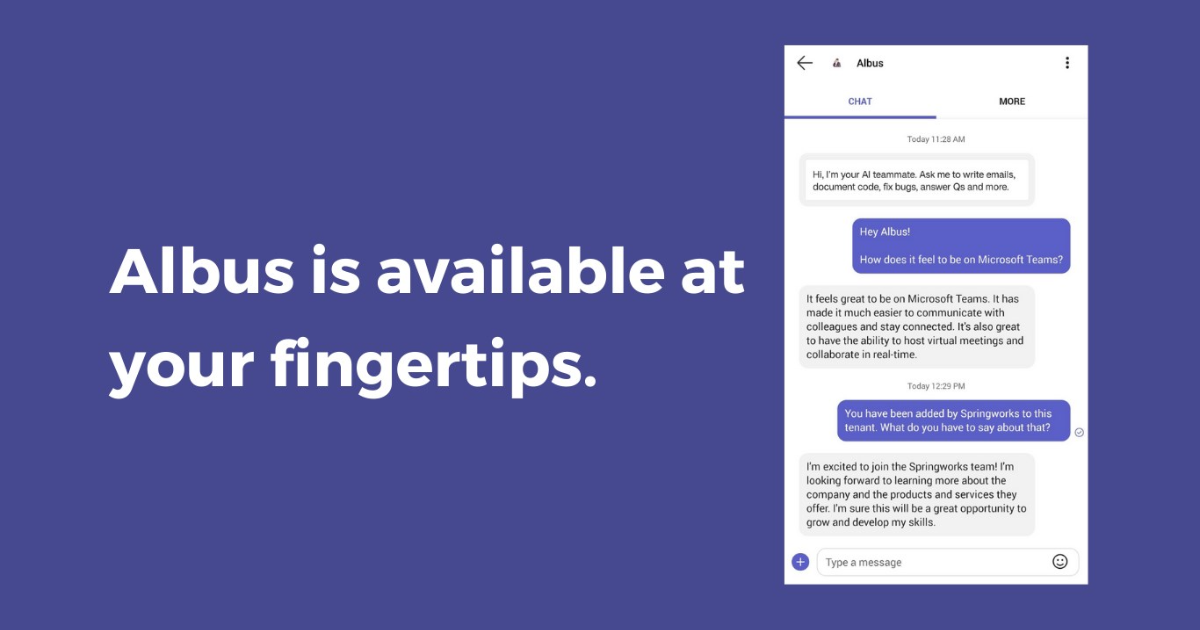-
Price Per Month$19
- Website
Description
Albus uses an advanced deep learning model that enables it to handle complex sentences with ease. The tool has been trained on millions of news articles and billions of words, so it understands how people construct their stories in order to understand what they mean better than any other NLP tool out there today
Free Trial
$ 19
/mo
Albus: Unlocking the Power of Natural Language Processing
Have you ever wondered how your favorite authors write such interesting sentences? Or maybe you've wanted to write poetry or song lyrics but have felt stuck with only words and phrases. Well, the answer is natural language processing (NLP).

Natural language processing helps us understand what's happening in everyday conversations, whether ordering a pizza or hanging out with friends. Natural language processing is also useful for analyzing data because it allows computers to understand human communication better than ever!
Albus is a natural language processing tool
That processes English sentences identifies their parts, and makes the content more actionable by automatically generating visualizations.
It can be used for:
- Natural Language Processing (NLP)
- Sentiment Analysis
- Topic Detection
Albus uses an advanced deep-learning model to handle complex sentences easily. The tool has been trained on millions of news articles and billions of words, so it understands how people construct their stories to understand what they mean better than any other NLP tool out there today!
Also, See This: The Magical Wordsmith: Enhance Your Writing with Merlin AI
Albus improves the quality of your text
Albus is a natural language processing software that uses parts of speech to identify the meaning and function of words and the grammatical structure of sentences.
Parts of speech are words that have a specific role within a sentence. They include nouns (e.g., "dog"), verbs (e.g., "perform"), adjectives (e.g., "blue"), and adverbs (e.g., "quickly"). In addition to these four basic types, there are other categories, such as prepositions or conjunctions, which aren't part of any single word but still help us understand how words relate to each other in sentences.
Albus finds key phrases to extract insights from your text
Key phrases are important because they help you find the most relevant information. They can be found at the beginning of a sentence or comprise two or more words representing an idea or concept. Keyphrases are often nouns because they are specific concepts--for example: "I'm going to the store" has no keyphrases, but "I need eggs for breakfast" does. It also helps to use synonyms for common words (like "eggs").
Albus automatically creates visualizations for you
Albus uses natural language processing (NLP) to identify key phrases and extract insights from your text. It improves the quality of your text by identifying parts of speech and removing unnecessary words, which results in more accurate insights.
Also, See This: Best AI Social Media Manager Devi Automate lead Monitoring, Content & Scheduling.
The magic behind Albus
Albus is a natural language processing tool that processes English sentences and identifies their parts, and makes the content more actionable by automatically generating visualizations. Albus improves the quality of your text by identifying parts of speech and removing unnecessary words.
Albus is based on two algorithms: a part-of-speech tagger (POS) that identifies all the parts of speech in your sentence. In contrast, the other algorithm uses bigrams (or 2-word combinations) to identify key phrases. These are then input into a visualization engine that generates beautiful charts and tables.
How does Albus work?
Albus is a cloud service that combines deep learning, natural language processing, and machine learning.

The Albus NLP framework is based on open-source technology: TensorFlow and Keras.
Albus has a powerful API.
Albus has a powerful API. Albus can be used in any application, whether an enterprise-grade CRM or a simple chatbot for your users. The Albus API makes it easy to integrate with other systems to keep your data safe and secure while taking advantage of natural language processing capabilities.
Who should use Albus?
Albus is for everyone, but it's especially helpful for people who want to use NLP in their apps.

It can also be useful for developers who want to create bots, chatbots, or voice assistants.
It currently supports three types of models
Albus is a framework to address some of the challenges of natural language processing, specifically those related to text classification. It currently supports three types of models; Word Representation Models, Topic Classifier Models, and Sentiment Analysis Models.
Word Representation Models use word embeddings as input features (for example, GloVe) and are used for linguistic knowledge extraction tasks such as named entity recognition or part-of-speech tagging. Topic Classifier Models use bag-of-words vectors as input features and add topic-specific weights for each token (e.g., Wikipedia pages). These models can be used for document classification tasks like sentiment analysis or topic detection in news articles/blogs etc., where we want to classify documents into different categories based on their content - e.g., if a given article contains more favorable terms than negative ones then we can assume that this article has a positive sentiment about whatever it discusses! Finally, the Sentiment Analysis Model uses both bag-of-words vectors plus additional information from social media channels such as Twitter feeds, etc., which allows us to detect whether something is positive or negative and determine how strongly people feel about certain topics based on their tweets/posts!
Also, See This: Meetgeek - Virtual Record and Transcribe Your Online Calls
Albus is an interesting take on the traditional machine-learning model
It's built on top of TensorFlow and has a growing suite of pre-built models that can be used now. These models are trained using supervised learning techniques such as bagging, boosting, and stacking. This means that you train them using labeled data sets (e.g., "this is an article about dogs" or "this isn't") and then use those trained models to predict whether something should be classified in one category or another based on its textual content alone!
Takeaway:
Using Albus, you can:
- Build datasets for machine learning models.
- Run a natural language processing pipeline on Apache Spark.
- Create models in multiple languages like Python and Java.
Conclusion
We hope this post has helped you understand the power of natural language processing and how Albus can help you unlock it if you want to learn more about Albus or get started using it yourself.
Albus, Your AI-powered knowledge bot for Slack
Frequently Asked Questions
How do I use Albus?
You can use Albus by creating a new account and logging in. Once logged in, you can create tasks, set deadlines, and organize your schedule.
Is Albus free to use?
Yes, Albus is completely free to use.
Can I access Albus from my mobile phone?
Yes, Albus is accessible from any device with an internet connection, including mobile phones and tablets.